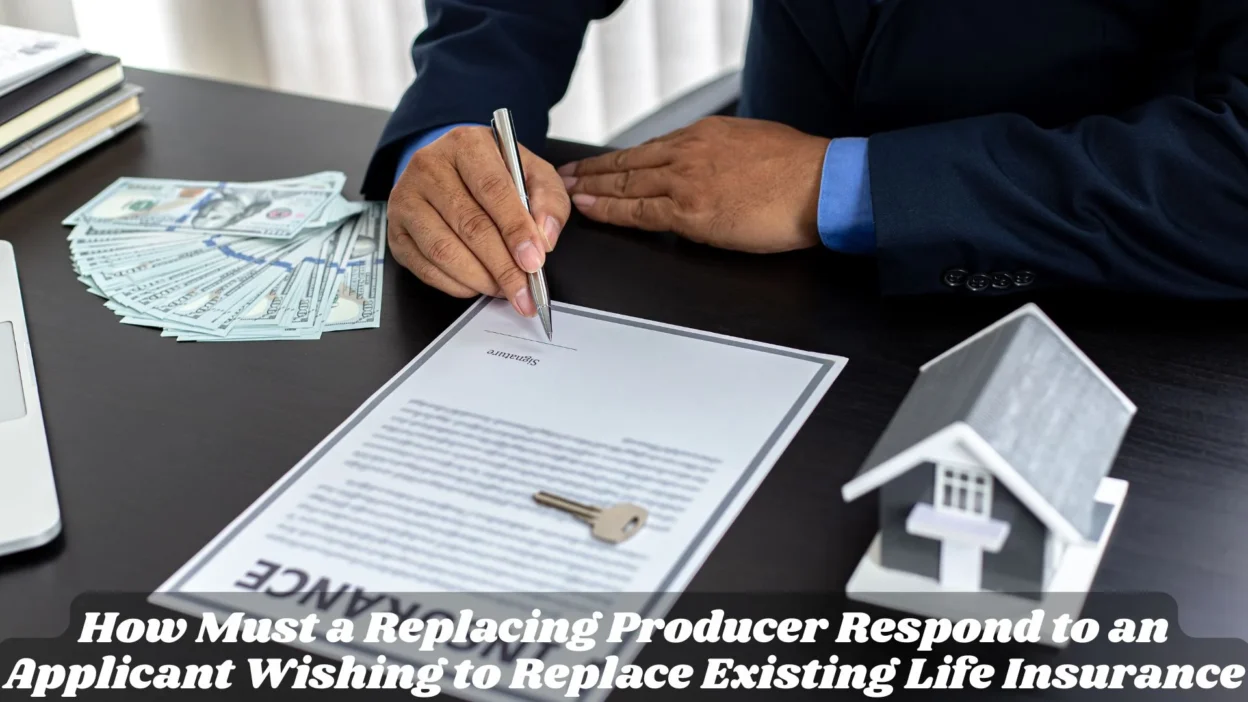If you’re wondering how must a replacing producer respond to an applicant wishing to replace existing life insurance, you’re not alone.
You might be looking for the right way to describe it clearly, professionally, or casually. The moment you start reading this article, your search ends.
Life insurance can be complex. When someone wants to switch policies, there are legal, emotional, and business matters involved.
A replacing producer — the new agent or broker — has a big responsibility. But how they respond depends on the context: is it a formal setting, a casual conversation, a workplace meeting, or a client email?
This guide breaks it all down for you. We’ll explore the many ways to say how must a replacing producer respond to an applicant wishing to replace existing life insurance, depending on the tone and setting.
Formal Ways to Say
How must a replacing producer respond to an applicant wishing to replace existing life insurance
When writing legal, official, or compliance-focused documents, formality is key. These phrases work well in policies, reports, or professional letters.
- What protocol should a new producer follow when an applicant seeks to substitute their current life insurance policy
- What actions are expected of a replacement agent during a life insurance transition
- What is the required course of action for a producer handling a life insurance replacement request
- What process must be observed by a producer assuming a replacement role
- What steps must be taken by a producer facilitating the exchange of life policies
- What guidelines should a new producer adhere to when a client wants to switch life policies
- What procedures govern producer conduct during a policy replacement
- What response is deemed appropriate from a producer handling policy substitution
- What regulations apply to producers managing a life insurance switch
- What approach must be taken when assuming responsibility for a replacement policy
- What standards are in place for handling life insurance policy changes
- What conduct is required of a producer involved in replacing an existing policy
- What formal response is necessary from a new producer replacing life insurance
- What compliance obligations exist for producers during a replacement process
- What duties must a producer fulfill when taking over an applicant’s policy
- What is the mandated response by a producer in a replacement scenario
- What response aligns with legal standards in a policy switch
- What framework must a producer follow during a replacement procedure
- What instructions govern the producer’s actions during a client’s switch
- What actions are prescribed by industry guidelines for life insurance replacement
- What measures must be taken in accordance with insurance regulations
- What is the required disclosure process for producers replacing policies
- What ethical considerations apply when an applicant requests a replacement
- What responsibilities lie with the producer during the policy change process
- What actions are necessitated by the replacement of an existing life policy
- What procedure should be initiated by the replacing party
- What process is endorsed by insurance compliance standards
- What approved methods should a producer use in replacement cases
- What official protocols exist for responding to a replacement inquiry
- What course of action is advised by regulatory authorities
Informal Ways to Say
How must a replacing producer respond to an applicant wishing to replace existing life insurance
Everyday talk between agents, customers, or friends often sounds more relaxed. Here are casual ways to get the same message across.
- What should the new agent do if someone wants to change their life insurance
- How should a producer handle it when a client wants to switch policies
- What’s the right way to help a client replace their old life policy
- How do you respond if someone’s looking to trade their life insurance
- What’s the next move when a client wants to drop one policy and get another
- How do you go about helping someone replace life insurance
- What do you do if a client wants to dump their current policy
- How do you step in when someone wants to go with a different life plan
- What’s the process if a client wants to upgrade their life policy
- How do you deal with a customer who wants to make a switch
- What’s expected when you take over from another agent
- How do you guide someone who wants to leave their old plan
- What’s your role when a client’s switching insurance
- How do you help someone cancel and get a new life policy
- What steps should you take when someone wants to switch providers
- What’s the game plan when someone’s replacing their coverage
- How do you handle someone moving from another life policy
- What’s your move when someone wants new life coverage
- How should you act if someone’s shopping for better terms
- What do you say to someone thinking of replacing their insurance
- How do you handle it when a customer isn’t happy with their old policy
- What’s your job when a client says they’re switching
- How do you respond when a new policy is about to replace the old one
- What’s the best way to support someone through the switch
- What should you do when someone wants to change life plans
- How do you help someone trade their coverage
- What do you do when a client is ready to replace a policy
- How do you jump in when someone wants to switch it up
- What’s the right approach when a customer wants new coverage
- How do you help someone move to a new life plan
Idiomatic Ways to Say
How must a replacing producer respond to an applicant wishing to replace existing life insurance
Adding some flavor with idioms makes conversations more relatable and fun. These phrases work in presentations, casual meetings, or storytelling.
- Step up to the plate when a client wants to switch
- Take the reins in a policy change
- Roll with the punches during a replacement request
- Pass the torch smoothly from the old agent
- Keep your ducks in a row when replacing a policy
- Dot the i’s and cross the t’s in the process
- Take the wheel on a policy switch
- Be on the ball when someone wants to trade plans
- Bridge the gap between old and new coverage
- Take it from here with confidence
- Get your act together for a seamless transition
- Hold the fort during a policy change
- Jump through the hoops of replacement
- Hit the ground running when a client wants to switch
- Keep things above board during the replacement
- Stay ahead of the curve with replacement steps
- Go by the book in handling switches
- Pick up the slack from the former agent
- Cover your bases when replacing policies
- Show them the ropes of their new plan
- Lay it all out when someone wants to switch
- Put your cards on the table about the changes
- Walk the client through the changeover
- Take care of business during the replacement
- Get into the driver’s seat on the new plan
- Be the go-to for the switch
- Close the deal without dropping the ball
- Tidy things up between policies
- Take charge of the life policy handover
- Nail down the steps with confidence
Professional Ways to Say
How must a replacing producer respond to an applicant wishing to replace existing life insurance
In a workplace, the right tone builds trust. These expressions work well in meetings, emails, and presentations.
- Please confirm the procedures for handling a replacement request
- The appropriate steps must be taken to initiate the policy change
- Ensure all compliance guidelines are met during replacement
- It is essential to review disclosure obligations before proceeding
- Kindly assist the applicant through the switch process
- The producer should verify all forms are accurately completed
- Take prompt action to align with company protocols
- Proper documentation must be submitted without delay
- Address the client’s concerns during the replacement process
- Follow up with the applicant to confirm their intentions
- Notify the current insurer as required by law
- Review all comparison details with the applicant
- Provide clear information on potential changes in benefits
- Submit replacement notices as per regulatory standards
- Maintain a record of all replacement discussions
- Uphold transparency when discussing the new policy
- Clarify any risks involved in the switch
- Act professionally while transitioning policies
- Ensure the client understands policy differences
- Consult your supervisor if unsure of the procedure
- Keep the client’s best interest at the forefront
- Obtain written consent before moving forward
- Explain all fees or charges related to switching
- Collaborate with underwriting to expedite approval
- Outline the timeline of the new coverage
- Highlight why the new policy may be more beneficial
- Make sure no lapse in coverage occurs
- Document all communication clearly and accurately
- Be timely and courteous in all follow-ups
- Stay informed on current replacement regulations
Conclusion
Knowing how a replacing producer should respond to an applicant wishing to replace existing life insurance is more than just a legal task — it’s a mix of professionalism, empathy, and clarity. Each context — formal, casual, idiomatic, or professional — calls for different language.

Emilly Dickson is a renowned Urdu author, researcher, and storyteller known for his insightful take on contemporary social issues. His writing style is simple yet thought-provoking, engaging readers while encouraging them to reflect on deeper themes.
Professionally, he is an academic with a PhD in Urdu Literature and has been involved in teaching for over a decade. His works have been published in various national and international literary journals. Dr. Alvi is also a mentor to aspiring writers and an active participant in literary forums and events.
Selected Works:
-
The Screams of Silent Words
-
Travelers of Shadows
-
A Story Stuck on the Lip




